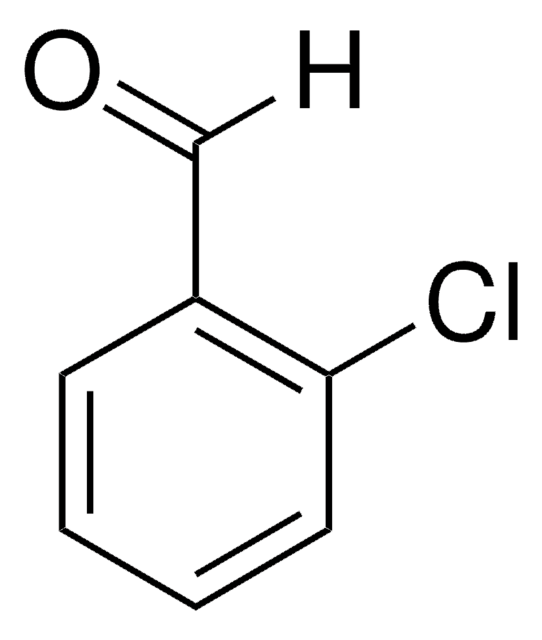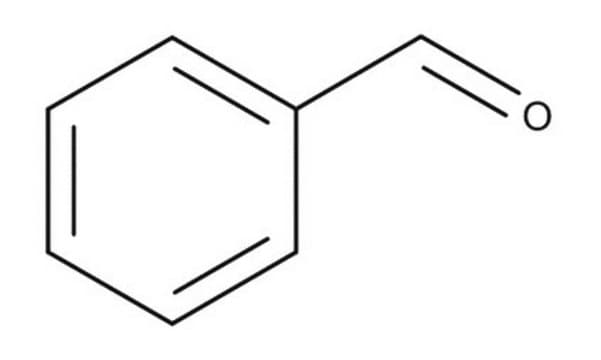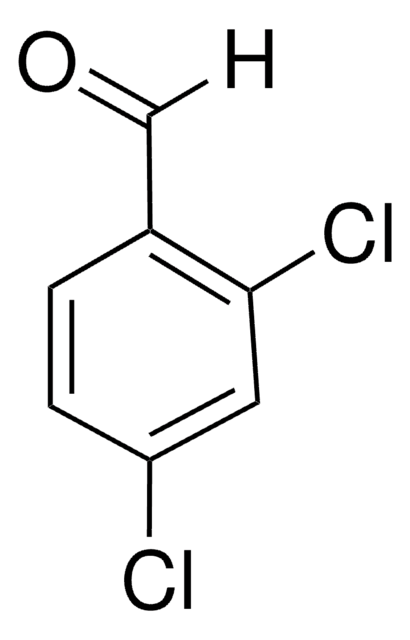8.20276
2-Chlorobenzaldehyde
for synthesis
Synonym(s):
2-Chlorobenzaldehyde
About This Item
Recommended Products
vapor pressure
1.7 hPa ( 50 °C)
Quality Level
Assay
≥98.0% (GC)
form
liquid
autoignition temp.
397 °C
potency
2160 mg/kg LD50, oral (Rat)
pH
2.9 ( in H2O, saturated aqueous solution)
mp
10 °C
transition temp
flash point 87 °C
solubility
1.8 g/L
density
1.25 g/cm3 at 20 °C
storage temp.
2-30°C
InChI
1S/C7H5ClO/c8-7-4-2-1-3-6(7)5-9/h1-5H
InChI key
FPYUJUBAXZAQNL-UHFFFAOYSA-N
Application
- Synthesis, structural and spectroscopic properties of Co (II), Ni (II) and Cu (II) complexes with 2-((2-chlorobenzylidene) amino) acetohydrazide hydrate and their Antimicrobial and antioxidant activities: Focuses on the synthesis of metal complexes using 2-chlorobenzaldehyde for enhanced antimicrobial and antioxidant properties (FM Al-Azab, Y Mosa′d Jamil, AA Al-Gaadbi, 2023). Link to article
- Synthesis and Aminomethylation of 2-Amino-4-(2-chlorophenyl)-6-(dicyanomethyl)-1,4-dihydropyridine-3,5-dicarbonitrile N-Methylmorpholinium Salt: Discusses the synthesis involving 2-chlorobenzaldehyde in the production of novel organic compounds (AO Kurskova, VV Dotsenko, KA Frolov, 2022). Link to article
- Metal Complexes of Schiff Bases Prepared from Quinoline-3-Carbohydrazide with 2-Nitrobenzaldehyde, 2-Chlorobenzaldehyde and 2, 4-Dinitrobenzaldehyde: Studies the synthesis and spectral analysis of Schiff base metal complexes incorporating 2-chlorobenzaldehyde (M Sunjuk, L Al-Najjar, M Shtaiwi, BI El-Eswed, 2023). Link to article
- Application of 2-chlorobenzaldehyde thiocarbohydrazone as a chromogenic ligand for cadmium (II) detection and removal from water and food: Explores the use of a derivative of 2-chlorobenzaldehyde as a sensitive reagent for detecting and removing cadmium from various samples (AV Sadlapurkar, UB Barache, AB Shaikh, 2024). Link to article
Analysis Note
Density (d 20 °C/ 4 °C): 1.248 - 1.250
Identity (IR): passes test
Due to its specific melting range the product may be solid, liquid, a solidified melt or a supercooled melt.
Signal Word
Danger
Hazard Statements
Precautionary Statements
Hazard Classifications
Eye Dam. 1 - Skin Corr. 1B - Skin Sens. 1
Storage Class Code
8A - Combustible, corrosive hazardous materials
WGK
WGK 2
Flash Point(F)
206.6 °F - closed cup
Flash Point(C)
97 °C - closed cup
Regulatory Listings
Regulatory Listings are mainly provided for chemical products. Only limited information can be provided here for non-chemical products. No entry means none of the components are listed. It is the user’s obligation to ensure the safe and legal use of the product.
FSL
Flammable liquids
Type 3 petroleums
Hazardous rank III
Water insoluble liquid
ISHL Indicated Name
Substances Subject to be Indicated Names
ISHL Notified Names
Substances Subject to be Notified Names
Certificates of Analysis (COA)
Search for Certificates of Analysis (COA) by entering the products Lot/Batch Number. Lot and Batch Numbers can be found on a product’s label following the words ‘Lot’ or ‘Batch’.
Already Own This Product?
Find documentation for the products that you have recently purchased in the Document Library.
Our team of scientists has experience in all areas of research including Life Science, Material Science, Chemical Synthesis, Chromatography, Analytical and many others.
Contact Technical Service










